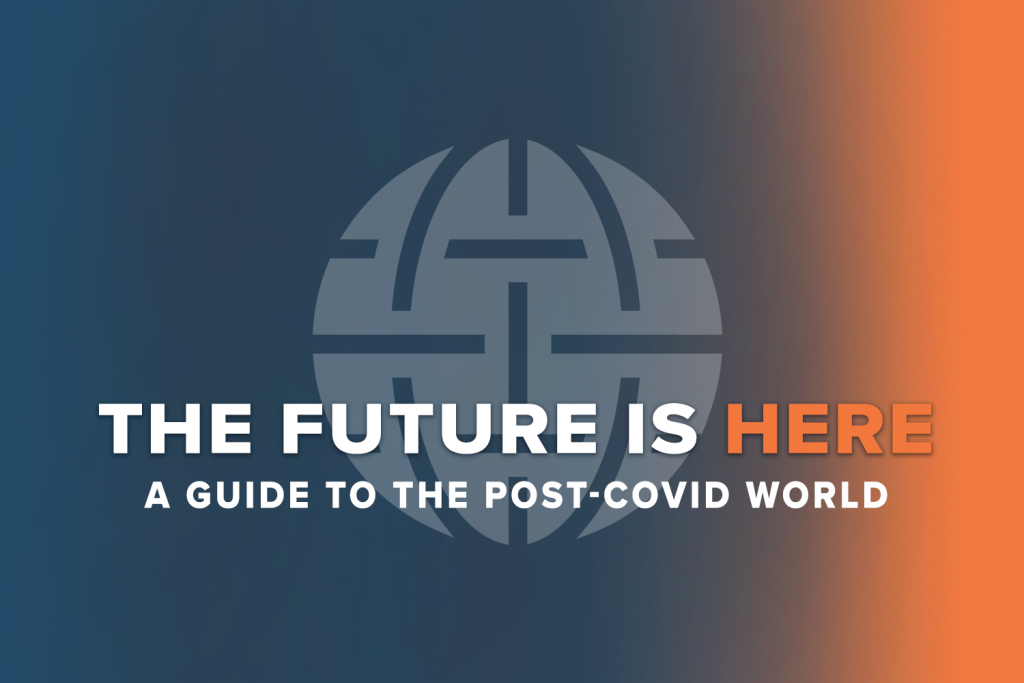The future is here: A guide to the post-COVID world 01/15/2021
Welcome to your guide to where the world is headed during the pandemic era and beyond. Each week, we’ll bring you the latest and most significant expert insights and international news about how coronavirus is reshaping international affairs. To stay updated each week, sign up to the newsletter here.
Let’s take a spin around the globe, in seven minutes or less.
In top stories this week:
- Mistrust in governments and the media could hamper vaccine rollouts worldwide.
- The United Kingdom is aiming for 24/7 COVID-19 vaccinations.
- New variants of the virus will emerge and lead to a more rapid spread of infections, begging the question: Will 2021 really be better than 2020?
- But first…
The big story
This week’s key theme: The promises and pitfalls of the post-COVID workplace
For many people, remote work has become a central part of their pandemic experience. But as the BBC chronicles, that freedom isn’t available to everybody. Outbreaks of COVID-19 infections have been attributed to inadequate sick-leave provisions for in-person workers in countries such as Canada and the United States, while employees worldwide—from garment workers in Asia to young people in Latin America and the Caribbean—are grappling with escalating unemployment rates.
For those fortunate enough to still have a job but without the luxury of doing it from home, new technology has stepped into the breach—perhaps foreshadowing how workplaces could be transformed when more people return to the office as the pandemic ebbs. In settings such as the BBC’s offices in the United Kingdom and CERN’s physics lab on the Swiss-French border, a warning buzzer goes off when colleagues get closer than six feet apart from each other. Meanwhile, in the United States, NBA players and staff are wearing wrist sensors to enforce social distancing. In Europe, workplaces from banks to warehouses, airports, and factories are experimenting with “fever-testing thermal cameras, mask-detection systems, and tracking software,” colliding with the premium that many in the region place on privacy, Bloomberg reports.
In the United States, meanwhile, the infectious-diseases expert Anthony Fauci sees “some little glimmer” of hope as the vaccine rollout gradually builds momentum there. Indonesia, the world’s fourth-largest country by population, will soon start mass inoculations. In Europe, where vaccines have been slow to get into arms in Germany, the Netherlands, and France, regulators have approved Moderna’s vaccine—as has the health ministry in Israel, among the many countries to set tough new restrictions on movement as infections increase. And while it’s certainly in a league apart from the world’s larger countries, the tiny island nation of Palau may be poised for a big achievement: becoming one of the world’s first to inoculate its entire population.
Many people are pining for a return to the office once the pandemic allows—with some going so far as engaging in pretend commutes in an attempt to separate work and leisure time. But the transformations in the nature of work that have occurred while they’ve been out of the office underscore a reality that we may only now be facing up to: There likely won’t be a return to a pre-pandemic normal.
Subscribe to The future is here: A guide to the post-COVID world
Sign up for a weekly roundup of top expert insights and international news about how coronavirus is reshaping international affairs.

The world in brief
Insights from across the planet, in ten bullets or fewer
- Global mistrust could stymie the vaccine drive. Declining trust in governments and the media is threatening to limit the impact of COVID-19 vaccination roll-outs, The Associated Press reports, citing a new survey by the communications firm Edelman. The fact that only one-third of people are willing to get a COVID shot straight away, in part due to skepticism about the vaccine, crystallizes the dangers of misinformation, the news service cites CEO Richard Edelman as saying. For instance, cynicism towards COVID-19 shots in France, one of the most vaccine-skeptical countries in the world according to polls, will make the inoculation drive there more challenging, CNBC reports.
- Web meets med: YouTube is partnering with clinics on coronavirus misinformation. YouTube will team up with health organizations including the Cleveland Clinic and Mayo Clinic to create more accurate videos about COVID-19 for its video platform, Bloomberg reports. It’s an attempt to push back against the problem of online misinformation about the pandemic and marks a rare departure for Google-owned YouTube, which prefers only to host rather than be responsible for content, the newswire adds.
- The United Kingdom is aiming for round-the-clock distribution. UK Prime Minister Boris Johnson says vaccinations will be offered 24/7 once supplies allow, the BBC reports. Meanwhile global drug-makers have pushed back against UK plans to give as many first doses to as many people as soon as possible, which would extend each recipient’s wait until their second dose, Bloomberg reports, Industry groups joined regulators in Europe and the United States in raising questions about changes to shots’ dosage or timing in order to stretch supplies, the newswire adds.
- QUOTE: “[M]ore rapid deployment of vaccines might not stem the risk of litigation from those looking to assert blame for delays and other glitches in treatment,” Samuel Tarry and Davis Walsh, partners at McGuireWoods LLP, write for the news service Stat. “At a stage that could mark an endgame for the COVID-19 pandemic, it’s more important than ever to clarify legal protections so health providers devote their time and attention to patients instead of fending off lawsuits.”
- Looking ahead, more infectious variants of coronavirus will emerge more often. The new variants will lead to fresh waves of infections such as the ones that are threatening to overwhelm hospitals in the United Kingdom and South Africa, Salim Abdool Karim, the epidemiologist who led South Africa’s fight against HIV/AIDS, says in an interview with the Financial Times. It’s too early to know what immunity current vaccines will provide to the new variants, Abdool Karim adds. Separately, US scientists have discovered two new variants in Ohio, adding to concerns that the disease could be mutating worldwide and escaping the notice of public-health bodies, the newspaper also reports.
- QUOTE: “If you had expected 2021 to be a relief from the horrors of 2020, sorry: So far it’s looking worse,” Tyler Cowen, a professor of economics at George Mason University, writes on Bloomberg. “[T]he current coronavirus pandemic is unlikely to be the last, and it may not even be the worst. While the vaccines have been wonderful advances, we do not have the capability to distribute them quickly or efficiently.”
- A decade of low spending on healthcare is coming back to bite Southern Europe during the coronavirus pandemic, The Wall Street Journal reports, citing healthcare experts and doctors. Countries across the region, including Italy, implemented austerity budgets following the Global Financial Crisis. How deep was the plunge? In Greece, the budget dropped by almost a third between 2009 and 2019, the Journal adds.
- A tsunami of debt is threatening even peaceful and stable middle-income countries. National budgets have come under pressure as countries struggle with the cost of medical supplies, field hospitals, and vaccines, and as tax revenues decline because of COVID-19, The Washington Post reports, citing examples from Costa Rica, Angola, and Zambia. But that’s not all: Tourists have stayed away from these countries amid pandemic restrictions. Commodity prices, including oil, have also declined, dealing another blow to budgets, the newspaper adds.
The inside scoop
Insights from the Atlantic Council



